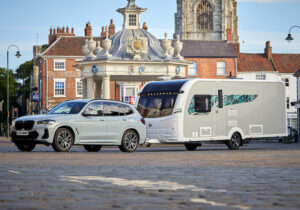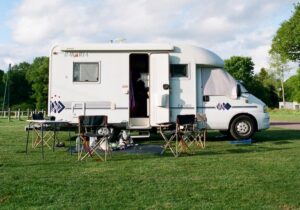by Holly Tribe
Festival season is nearly upon us, and dreams of sun drenched weekends filled with music and revelry are soon to be realised. But the spectres of knee-deep mud, dubious toilet blocks, or soggy sleeping bags are enough to dampen even the most hardened festival goers’ spirit.
Glastonbury is widely accepted as the biggest UK festival; 175,000 people attend every year to catch some of the biggest headliners in the world; Paul McCartney, Jay-Z and U2 to name but a few. And with tens of thousands of outfits expected on site during the week long event, it also qualifies as one of the largest caravan and motorhome meets in the UK.
So, if you don’t fancy joining the great unwashed, help is at hand! Showers, flushing toilets and even hot water are available if you come armed with a caravan, motorhome or campervan. There are two fields dedicated to touring vehicles which open on the Tuesday; one to the east and one to the west of the festival site.
Rent-a-rig
If you don’t have a caravan, or don’t fancy hauling your own rig half way across the country, there are a number of caravan and motorhome hire companies that offer a rental service. Customers have the choice of picking up a caravan direct from a retail outlet, or to have the vehicle delivered directly to the site ahead of time. Rental contractors can organise access with the off-site manager to come and set up the rig before your arrival.
Tilshead Caravans in Salisbury has a range of motorhomes and caravans available for hire. Each model comes fully equipped with all the cooking and washroom mod cons, and customers can choose a number of accessories to enhance their stay, including a picnic table and chairs or colour TV. The base rate for a two berth caravan for a week’s rental is £345, or £450 for a six berth.

If you want to get into the festival spirit in a lovingly restored vintage caravan, then Hazy Days Caravan Hire have two fabulous rigs available to rent – a 1967 three berth Pearman Briggs Safari or a 1972 two berth Carlight Casalette. Both vans are available for the entirety of the festival for £700. The company will deliver and pick up to the campervan field, and they also have representatives on site should you need any caravan-related help during the festival.
DIY caravanning
If you’ve decided to dodge the mud and take your own rig, there are a couple of things to be aware of. Facilities on site include fresh water, and waste water collection points along with further toilet facilities. The fields are surrounded by steel shield fencing and patrolled by security staff to keep your belongings safe and sound.

Glass bottles are prohibited, so don’t forget to decant any liquids into plastic alternatives before you arrive. Campervan and caravan passes cost £75 per vehicle on top of your festival pass, but vehicles longer than seven metres are required to purchase two campervan tickets to cover the extra space required. For more information about taking a caravan or campervan to the festival and find out how to purchase tickets, click here.
Power up
Glastonbury, and indeed the majority of festivals with provision for touring vehicles, don’t allow generators or provide electric hook up in the camping fields, so you’ll need to provide your own power supply to last throughout the festival. Solar panels can help keep your leisure batteries topped up, via trickle battery chargers, and it’s a good idea to come armed with a spare gas canister as back up in case you run out. There’s nothing more frustrating that having all the trappings of an full English with nothing to cook it on!


 brief with a two-wheel drive version. The firm explains it cuts 75kg from the kerbweight while adding stop-start technology for greater economy. Yet some purists will refuse to accept what is seen as brand dilution.
brief with a two-wheel drive version. The firm explains it cuts 75kg from the kerbweight while adding stop-start technology for greater economy. Yet some purists will refuse to accept what is seen as brand dilution. 



